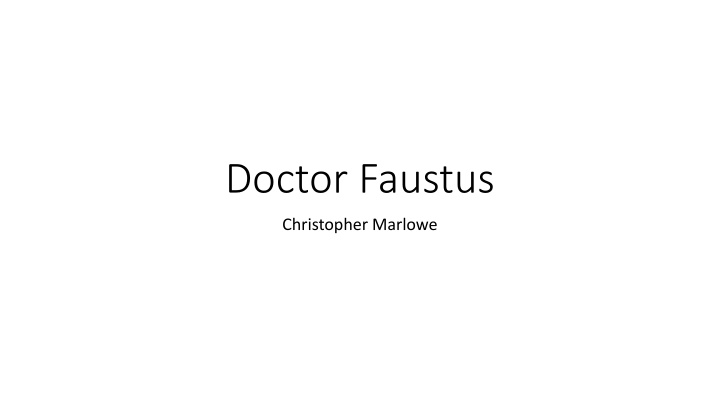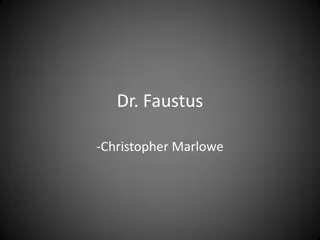
Doctor Faustus - Tragic Tale of a Scholar's Deal with the Devil
"Explore the tragic story of Doctor Faustus, a respected scholar who delves into the dark arts in search of ultimate knowledge and power, striking a dangerous deal with the devil that leads to a gripping narrative of temptation, regret, and consequences."
Uploaded on | 2 Views
Download Presentation

Please find below an Image/Link to download the presentation.
The content on the website is provided AS IS for your information and personal use only. It may not be sold, licensed, or shared on other websites without obtaining consent from the author. If you encounter any issues during the download, it is possible that the publisher has removed the file from their server.
You are allowed to download the files provided on this website for personal or commercial use, subject to the condition that they are used lawfully. All files are the property of their respective owners.
The content on the website is provided AS IS for your information and personal use only. It may not be sold, licensed, or shared on other websites without obtaining consent from the author.
E N D
Presentation Transcript
Doctor Faustus Christopher Marlowe
Author Christopher Marlowe, also known as Kit Marlowe, was an English playwright, poet and translator of the Elizabethan era. Marlowe is among the most famous of the Elizabethan playwrights. Born: February 6, 1564, Canterbury, United Kingdom Died: May 30, 1593, Deptford, United Kingdom Buried: June 1, 1593, Deptford St Nicholas
Source The Tragical History of the Life and Death of Doctor Faustus, commonly referred to simply as Doctor Faustus, is an Elizabethan tragedy by Christopher Marlowe, based on German stories about the title character Faust. Faust is a tragic play in two parts by Johann Wolfgang von Goethe, usually known in English as Faust, Part One and Faust, Part Two. Nearly all of Part One and the majority of Part Two are written in rhymed verse. Although rarely staged in its entirety, it is the play with the largest audience numbers on German-language stages. Faust is considered by many to be Goethe's magnum opus and the greatest work of German literature.
Plot Summary Doctor Faustus, a well-respected German scholar, grows dissatisfied with the limits of traditional forms of knowledge logic, medicine, law, and religion and decides that he wants to learn to practice magic. His friends Valdes and Cornelius instruct him in the black arts, and he begins his new career as a magician by summoning up Mephastophilis, a devil. Despite Mephastophilis s warnings about the horrors of hell, Faustus tells the devil to return to his master, Lucifer, with an offer of Faustus s soul in exchange for twenty-four years of service from Mephastophilis. Meanwhile, Wagner, Faustus s servant, has picked up some magical ability and uses it to press a clown named Robin into his service.
Mephastophilis returns to Faustus with word that Lucifer has accepted Faustus s offer. Faustus experiences some misgivings and wonders if he should repent and save his soul; in the end, though, he agrees to the deal, signing it with his blood. As soon as he does so, the words Homo fuge, Latin for O man, fly, appear branded on his arm. Faustus again has second thoughts, but Mephastophilis bestows rich gifts on him and gives him a book of spells to learn. Later, Mephastophilis answers all of his questions about the nature of the world, refusing to answer only when Faustus asks him who made the universe. This refusal prompts yet another bout of misgivings in Faustus, but Mephastophilis and Lucifer bring in personifications of the Seven Deadly Sins to prance about in front of Faustus, and he is impressed enough to quiet his doubts.
Armed with his new powers and attended by Mephastophilis, Faustus begins to travel. He goes to the pope s court in Rome, makes himself invisible, and plays a series of tricks. He disrupts the pope s banquet by stealing food and boxing the pope s ears. Following this incident, he travels through the courts of Europe, with his fame spreading as he goes. Eventually, he is invited to the court of the German emperor, Charles V (the enemy of the pope), who asks Faustus to allow him to see Alexander the Great, the famed fourth-century BCE Macedonian king and conqueror. Faustus conjures up an image of Alexander, and Charles is suitably impressed. A knight scoffs at Faustus s powers, and Faustus chastises him by making antlers sprout from his head. Furious, the knight vows revenge.
Meanwhile, Robin, Wagners clown, has picked up some magic on his own, and with his fellow stablehand, Rafe, he undergoes a number of comic misadventures. At one point, he manages to summon Mephastophilis, who threatens to turn Robin and Rafe into animals (or perhaps even does transform them; the text isn t clear) to punish them for their foolishness.
Faustus then goes on with his travels, playing a trick on a horse- courser along the way. Faustus sells him a horse that turns into a heap of straw when ridden into a river. Eventually, Faustus is invited to the court of the Duke of Vanholt, where he performs various feats. The horse-courser shows up there, along with Robin, a man named Dick (Rafe in the A text), and various others who have fallen victim to Faustus s trickery. But Faustus casts spells on them and sends them on their way, to the amusement of the duke and duchess.
As the twenty-four years of his deal with Lucifer come to a close, Faustus begins to dread his impending death. He has Mephastophilis call up Helen of Troy, the famous beauty from the ancient world, and uses her presence to impress a group of scholars. An old man urges Faustus to repent, but Faustus drives him away. Faustus summons Helen again and exclaims rapturously about her beauty. But time is growing short. Faustus tells the scholars about his pact, and they are horror-stricken and resolve to pray for him. On the final night before the expiration of the twenty-four years, Faustus is overcome by fear and remorse. He begs for mercy, but it is too late. At midnight, a host of devils appears and carries his soul off to hell. In the morning, the scholars find Faustus s limbs and decide to hold a funeral for him.
Chorus The chorus announces that this play will not be concerned with war, love, or proud deeds. Instead, it will present the good and bad fortunes of Dr. John Faustus, who is born of base stock in Germany and who goes to the University of Wittenberg, where he studies philosophy and divinity. He so excels in matters of theology that he eventually becomes swollen with pride, which leads to his downfall. Ultimately, Faustus turns to a study of necromancy, or magic.
The technique of the chorus is adapted from the traditions of classic Greek drama. The chorus functions in several ways throughout the play. It stands outside the direct action of the play and comments upon various parts of the drama. The chorus speaks directly to the audience and tells the basic background history of Faustus and explains that the play is to concern his downfall. The chorus is also used to express the author's views and to remind the audience of the proper moral to be learned from the play itself. The opening speech of the chorus functions as a prologue to define the scope of the play.
The chorus speaks in very formal, rhetorical language and explains that the subject of this play will not be that which is usually depicted in dramas. Instead of a subject dealing with love or war, the play will present the history of a scholar. The purpose of this explanation is that, traditionally, tragedy had dealt with such grand subjects as the history of kings, great wars, or powerful love affairs. Consequently, Marlowe is preparing the audience for a departure in subject matter. Most frequently, tragedy is concerned with the downfall of kings, and Marlowe's tragedy does not fit into this formula since this drama deals with the downfall of a man of common birth.
The Icarus image is used in the opening passage to characterize the fall of Faustus. Icarus was a figure in classical mythology who because of his pride had soared too high in the sky, had melted his wax wings, and subsequently had fallen to his death. This classical image of the fall of Icarus reinforces the Christian images of the fall of Lucifer brought out in Scene 3. Both images set the scene for the fall of Dr. Faustus during the course of the drama.
Another image used by the chorus to describe the situation of Faustus is that of glutting an appetite by overindulgence. Throughout the play, Faustus is seen as a person of uncontrolled appetites. His thirst for knowledge and power lead him to make the pact with the devil which brings about his downfall. The chorus points out the dangers involved in resorting to magic. It makes clear that Faustus is choosing magic at the danger of his own soul.
Characters Doctor John Faustus A learned scholar in Germany during the fifteenth century who becomes dissatisfied with the limitations of knowledge and pledges his soul to Lucifer in exchange for unlimited power. Wagner Faustus' servant, who tries to imitate Faustus' methods of reasoning and fails in a ridiculous and comic manner. Valdes and Cornelius Two German scholars who are versed in the practice of magic and who teach Faustus about the art of conjuring. Lucifer King of the underworld and a fallen angel who had rebelled against God and thereafter tries desperately to win souls away from the Lord. Mephistophilis A prince of the underworld who appears to Faustus and becomes his servant for twenty-four years.
Good Angel and Evil Angel Two figures who appear to Faustus and attempt to influence him. The Clown The clown who becomes a servant of Wagner as Mephistophilis becomes a servant to Faustus. Horse-Courser A gullible man who buys Faustus' horse, which disappears when it is ridden into a pond. The Pope The head of the Roman Catholic church, whom Faustus and Mephistophilis use as a butt of their practical jokes.
Charles V, Emperor of Germany The emperor who holds a feast for Faustus and at whose court Faustus illustrates his magical powers. Knight A haughty and disdainful knight who insults Faustus. In revenge, Faustus makes a pair of horns appear on the knight. Duke and Duchess of Vanholt A couple whom Faustus visits and for whom he conjures up some grapes. Robin An ostler who steals some of Dr. Faustus' books and tries to conjure up some devils.
Rafe (Ralph) A friend of Robin's who is present with Robin during the attempt to conjure up devils. Vintner A man who appears and tries to get payment for a goblet from Robin. Old Man He appears to Faustus during the last scene and tries to tell Faustus that there is still time to repent. Seven Deadly Sins, Alexander, Helen of Troy, and Alexander's Paramour Spirits or apparitions which appear during the course of the play. Chorus A device used to comment upon the action of the play or to provide exposition.
Faustus as a Renaissance Hero The character of Faustus can also be interpreted from the Renaissance point of view. At the time of this play, there was a conflict in many people's minds, including Marlowe's, as to whether or not to accept the medieval or the Renaissance view. The Renaissance had been disappointed in the effectiveness of medieval knowledge because many scholastic disputations were merely verbal nonsense. For example, arguments such as how many angels could stand on the head of a pin dominated many medieval theses. The Renaissance scholars, however, revived an interest in the classical knowledge of Greece and the humanism of the past. They became absorbed in the great potential and possibility of humanity.
According to the Renaissance view, Faustus rebels against the limitations of medieval knowledge and the restriction put upon humankind decreeing that he must accept his place in the universe without challenging it. Because of his universal desire for enlightenment, Faustus makes a contract for knowledge and power. His desire, according to the Renaissance, is to transcend the limitations of humanity and rise to greater achievements and heights. In the purest sense, Faustus wants to prove that he can become greater than he presently is. Because of his desire to go beyond human limitations, Faustus is willing to chance damnation in order to achieve his goals. The tragedy results when a person is condemned to damnation for noble attempts to go beyond the petty limitations of humanity.
Mephistophilis Mephistophilis is the second most important dramatic personage in the drama. He appears in most of the scenes with Faustus. When he is first seen by Faustus, he is horrendously ugly. Faustus immediately sends him away and has him reappear in the form of a Franciscan friar. The mere physical appearance of Mephistophilis suggests the ugliness of hell itself. Throughout the play, Faustus seems to have forgotten how ugly the devils are in their natural shape. Only at the very end of the drama, when devils come to carry Faustus off to his eternal damnation, does he once again understand the terrible significance of their ugly physical appearance. As Faustus exclaims when he sees the devils at the end of the drama, "Adders and serpents, let me breathe awhile! / Ugly hell, gape not."
Marlowes Style Before Marlowe, blank verse had not been the accepted verse form for drama. Many earlier plays had used rhymed verse; there are a few examples, such as Gorboduc, which had used blank verse, but the poetry in Gorboduc was stiff and formal. Marlowe was the first to free the drama from the stiff traditions and prove that blank verse was an effective and expressive vehicle for Elizabethan drama.
One of Marlowe's accomplishments was to capture in blank verse the music inherent in the English language. When Faustus sees Helen of Troy, he exclaims: Oh, thou art fairer than the evening air Clad in the beauty of a thousand stars! Brighter art thou than flaming Jupiter When he appeared to hapless Semele.
Earlier blank verse had been metrically precise and regular which, in long passages, could become rhythmically boring. Marlowe alternated the regular stresses and created a more varied, sincere, and beautiful verse. Shakespeare was later to follow Marlowe's example and use the natural rhythm of blank verse. Ofttimes, instead of using a rhyme, Marlowe uses other poetic techniques to give unity to a passage. As in the ending of the first two lines of the above passage, the assonance of "air" and "stars" imparts a controlled unity to the lines.
In one construction of his poetry, Marlowe did not end each line with a heavy and distinct pause. He often varied the caesuras within a line, and he also continued a thought from one line to another. Marlowe used the run-on line so as to give continuity to the poetry. For example, observe Faustus' opening speech. Settle thy studies, Faustus, and begin To sound the depth of that thou will profess.
Frequently, Marlowe will use geographical names and classical names merely for the resonant quality of the words themselves. In the following lines, More lovely than the monarch of the sky In wanton Arethusa's azured arms,
Note the use of the repetition of the "a" sound and the "r" sound. The reference to Arethusa, who was embraced by Jupiter, also has a more specific relationship to Faustus' desire to embrace Helen of Troy. But basically, the name does carry heavy alliterative and resonant qualities. Throughout the drama, the student should be aware of the highly ornamental language that Marlowe uses. His speeches are rich in allusions to classical myths. The style, however, has a musical quality about it which appeals to the ear even when the listener does not know the exact nature of the allusions.
The combination of the above qualities influenced the trend of blank verse in Elizabethan drama and earned for Marlowe's verse the term "Marlowe's Mighty Line."
Famous Quotes Hell is just a frame of mind. He that loves pleasure must for pleasure fall. Faustus: Stay, Mephistopheles, and tell me, what good will my soul do thy lord? Mephistopheles: Enlarge his kingdom. Faustus: Is that the reason he tempts us thus? Mephistopheles: Solamen miseris socios habuisse doloris. (It is a comfort to the wretched to have companions in misery.)
Mephistopheles: Why, this is hell, nor am I out of it. Think'st thou that I, who saw the face of God And tasted the eternal joys of heaven, Am not tormented with ten thousand hells In being deprived of everlasting bliss?
Fools that will laugh on earth, most weep in hell. Hell hath no limits, nor is circumscribed In one self place, for where we are is hell, And where hell is must we ever be. Was this the face that launched a thousand ships/And burnt the topless towers of Ilium? What art thou Faustus, but a man condemned to die?
Mephistopheles: Within the bowels of these elements, Where we are tortured and remain forever. Hell hath no limits, nor is circumscribed In one self place, for where we are is hell, And where hell is must we ever be. And, to conclude, when all the world dissolves, And every creature shall be purified, All places shall be hell that is not heaven.
The stars move still, time runs, the clock will strike Was this the face that launch'd a thousand ships, And burnt the topless towers of Ilium-- Sweet Helen, make me immortal with a kiss.--
If we say that we have no sin, We deceive ourselves, and there's no truth in us. Why then belike we must sin, And so consequently die. Ay, we must die an everlasting death.
I am Envy, begotten of a chimney-sweeper and an oyster-wife. I cannot read, and therefore wish all books were burnt; I am lean with seeing others eat - O that there would come a famine through all the world, that all might die, and I live alone; then thou should'st see how fat I would be! But must thou sit and I stand? Come down, with a vengeance .
All beasts are happy, For, when they die, Their souls are soon dissolv'd in elements; But mine must live still to be plagu'd in hell. Curs'd be the parents that engender'd me! No, Faustus, curse thyself, curse Lucifer That hath depriv'd thee of the joys of heaven.
I am Wrath. I had neither father nor mother: I leaped out of a lion's mouth when I was scarce half an hour old, and ever since I have run up and down the world, with this case of rapiers, wounding myself when I had nobody to fight withal. I was born in hell - and look to it, for some of you shall be my father.
FAUSTUS. Ah, Faustus, Now hast thou but one bare hour to live, And then thou must be damn'd perpetually! Stand still, you ever-moving spheres of heaven, That time may cease, and midnight never come; Fair Nature's eye, rise, rise again, and make Perpetual day; or let this hour be but A year, a month, a week, a natural day, That Faustus may repent and save his soul!
FAUSTUS: Where are you damnd? MEPHISTOPHILIS: In hell. FAUSTUS: How comes it, then, that thou art out of hell? MEPHISTOPHILIS: Why, this is hell, nor am I out of it:
Philosophy is odious and obscure; Both law and physic are for petty wits; Divinity is basest of the three, Unpleasant, harsh, contemptible, and vile. 'Tis magic, magic that hath ravished me.
FAUSTUS. [Stabbing his arm.] Lo, Mephistophilis, for love of thee, I cut mine arm, and with my proper blood Assure my soul to be great Lucifer's, Chief lord and regent of perpetual night!
FAUSTUS. Had I as many souls as there be stars, I'd give them all for Mephistophilis. By him I'll be great emperor of the world, And make a bridge thorough the moving air, To pass the ocean with a band of men; I'll join the hills that bind the Afric shore,
And make that country continent to Spain, And both contributory to my crown: The Emperor shall not live but by my leave, Nor any potentate of Germany. Now that I have obtain'd what I desir'd, I'll live in speculation of this art, Till Mephistophilis return again.





















